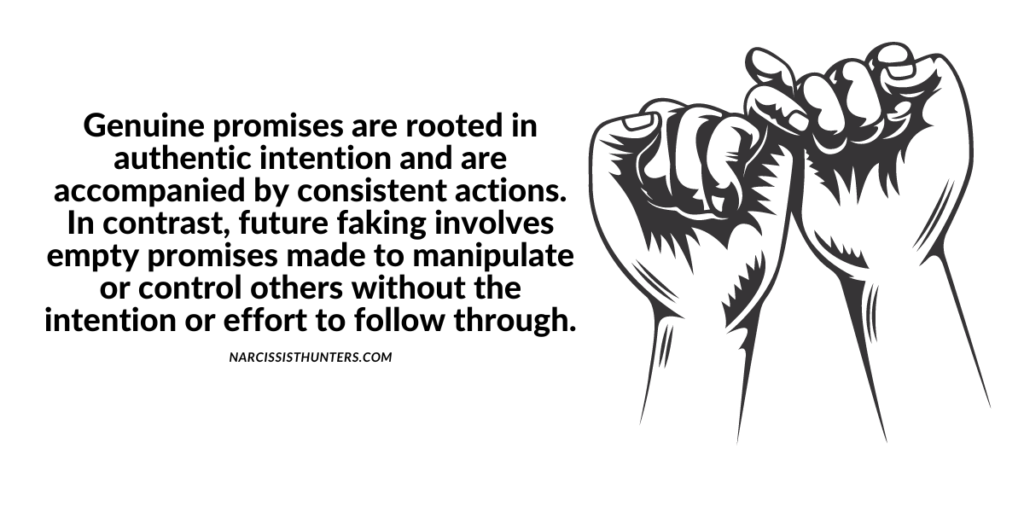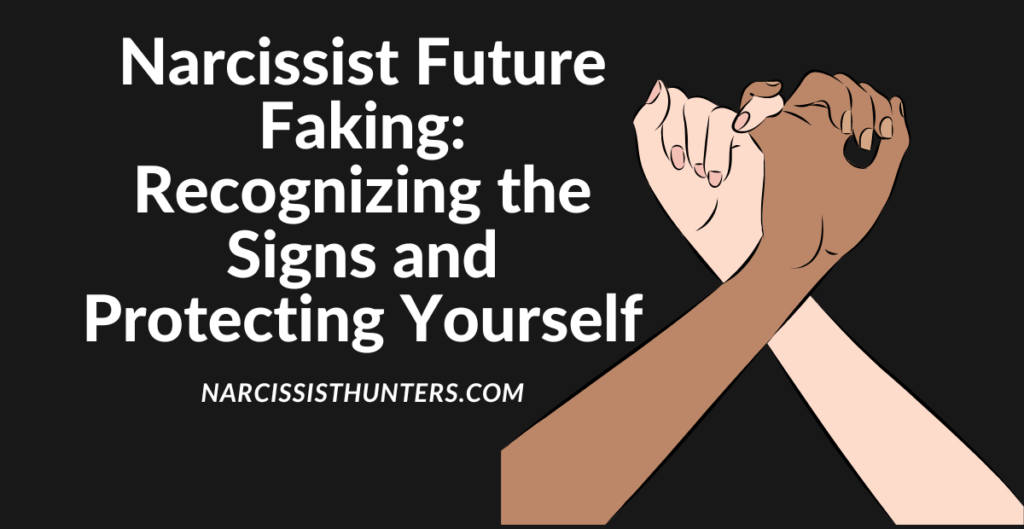Do you ever find yourself caught in a cycle of unfulfilled promises and shattered dreams? If so, you may be dealing with a manipulative tactic known as narcissist future faking. This insidious behavior, commonly exhibited by individuals with narcissistic traits, can wreak havoc on your emotional well-being and leave you feeling deceived and powerless.
But fear not, because in this blog post, we will dive deep into the world of narcissist future faking. Get ready to learn how to recognize the signs, understand the psychological impact it can have, and most importantly, discover effective strategies to protect yourself from its detrimental effects.
What is Narcissist Future Faking?

Narcissist Future Faking is a manipulative tactic employed by individuals with narcissistic traits to control and manipulate others. It involves making grandiose promises about the future without any intention or effort to follow through on those promises. The narcissist uses future faking as a means to maintain power, keep others emotionally invested, and fulfill their own self-serving agenda.
Signs of Narcissist Future Faking
Here are different signs of Narcissist future faking:
1. Overpromising without follow-through
Narcissists are skilled at making grandiose promises about the future but often fail to back them up with concrete actions. They excel at painting a captivating vision of what could be, enticing others with dreams that are unlikely to materialize.
2. Unrealistic and grandiose plans for the future
Future fakers often exhibit an inflated sense of self and may make outlandish claims about their future achievements or plans. Their promises may seem impressive initially, but upon closer inspection, they lack substance and feasibility.
3. Lack of consistent actions or effort to fulfill promises
One of the key indicators of future faking is the absence of consistent effort or actions to fulfill the promises made. Narcissists may show bursts of enthusiasm and make promises but quickly lose interest or shift their attention elsewhere.
4. Shifting goalposts and constant postponements
Future fakers frequently change the terms of their promises or postpone fulfilling them indefinitely. They manipulate others’ expectations by constantly moving the goalposts, making it difficult for individuals to hold them accountable.
Examples of Narcissistic Future Faking
I divided examples of narcissistic future faking into romantic relationships examples, professional relationships examples, and social relationships examples:
A. Romantic relationships
1.Promising commitment but avoiding commitment
Narcissists may speak eloquently about their desire for a committed relationship but continually shy away from taking the necessary steps to make it happen. They may use excuses or deflect responsibility to avoid genuine emotional intimacy.
2. Talking about a future together but never taking steps towards it
Future fakers in romantic relationships often discuss plans for the future, such as moving in together or starting a family. However, they consistently avoid concrete actions or discussions that would progress the relationship forward.
B. Professional relationships
1. Promising promotions or opportunities without delivering
Narcissistic individuals may dangle the prospect of promotions or exciting career opportunities as a means of manipulating and controlling their subordinates. However, they seldom follow through with their promises, leaving their employees feeling deceived and undervalued.
2. Making empty promises about collaborations or projects
In professional settings, future fakers may entice colleagues with promises of collaborative ventures or groundbreaking projects. Sadly, these promises rarely materialize, leaving others feeling exploited and frustrated.
C. Social relationships
1. Promising to spend time together but consistently canceling or rescheduling
Narcissists might make commitments to spend time with friends or loved ones but habitually cancel or reschedule at the last minute. This behavior shows a lack of respect for others’ time and feelings, leaving them feeling disregarded.
2. Making commitments to support or help but failing to follow through
Future fakers in social relationships often offer support or assistance, portraying themselves as reliable friends. However, they rarely follow through with their promises, leaving their friends feeling let down and unimportant.
Difference Between Genuine Promises and Future Faking

Genuine promises are rooted in authentic intention and are accompanied by consistent actions. In contrast, future faking involves empty promises made to manipulate or control others without the intention or effort to follow through.
It is vital to observe and evaluate whether the person’s actions align with their promises. Consistency and reliability over time are essential factors in distinguishing between genuine promises and future faking.
Trust plays a crucial role in differentiating between genuine promises and future faking. If an individual consistently demonstrates their trustworthiness through their actions, it is more likely that their promises are genuine.
Psychological Impact of Narcissist Future Faking in Relationships
Narcissist future faking can impact relationships badly:
A. Erosion of trust and emotional well-being
Consistent future faking erodes trust in relationships, leading to emotional distress and a sense of betrayal. The repeated disappointment and broken promises undermine one’s ability to trust others, making it challenging to form healthy connections in the future.
B. Self-doubt and feelings of inadequacy
Individuals who experience future faking often internalize the failure to fulfill promises, leading to self-doubt and feelings of inadequacy. They may question their worth and abilities, believing that they are to blame for the narcissist’s unkept promises.
C. Loss of hope and disappointment
The continual cycle of hope and disappointment created by future fakers can lead to a profound sense of disillusionment and loss of hope. Over time, individuals may lose faith in their own dreams and aspirations, becoming resigned to a cycle of unfulfilled promises.
D. Long-term effects on self-esteem and future relationships
The psychological impact of future faking can have long-lasting effects on self-esteem. It can erode one’s confidence, making it difficult to trust and engage in future relationships. The fear of being deceived and hurt again may hinder personal growth and hinder the ability to form genuine connections.
Is Future Faking a Common Narcissistic Trait?
Future faking is often observed in individuals with narcissistic traits. The narcissist’s need for control, admiration, and their grandiose sense of self can drive them to use future faking as a manipulative tool to maintain power and keep others emotionally invested.
Extensive research has been conducted on narcissistic behaviors, shedding light on their tactics, including future faking. Studies consistently highlight the correlation between narcissism and deceptive behaviors aimed at satisfying their self-serving agenda.
While not all narcissists engage in future faking, it is a common trait among this personality type. The desire to control others and maintain a favorable image often drives narcissists to employ manipulative tactics such as future faking to keep their victims hooked and under their influence.
How to Respond to Narcissist Future Faking?
You can respond to narcissist future faking in different ways:
A. Recognize the pattern and acknowledge the behavior
Awareness is the first step in protecting yourself from future faking. Recognize the pattern of promises made without follow-through and acknowledge the behavior for what it is—an attempt to manipulate and control.
B. Verify their intentions
Instead of taking their word at face value, ask for concrete evidence or actions that support their promises. Narcissists often struggle with providing evidence or following through, so this may help reveal their true intentions.
C. Focus on actions, not words
Pay more attention to the narcissist’s actions rather than their promises. Evaluate whether their actions align with their words. If there is a consistent pattern of broken promises, it may be time to reevaluate the relationship or your level of involvement.
D. Set clear boundaries and communicate expectations
Establish clear boundaries and communicate your expectations explicitly. Be assertive in expressing what you will and will not tolerate, making it more difficult for the narcissist to exploit your emotions.
E. Focus on self-care and prioritize personal well-being
Invest in self-care and prioritize your emotional well-being. Engage in activities that bring you joy and fulfillment, allowing yourself to heal from the emotional impact of future faking.
F. Consider detachment or ending the relationship
if necessary Evaluate the impact of future faking on your overall well-being and consider whether detachment or ending the relationship is the best course of action. Sometimes, protecting yourself requires removing toxic individuals from your life.
Last words
In conclusion, narcissist future faking is a manipulative behavior that can have devastating effects on individuals and their relationships. By understanding the signs, differentiating between genuine promises and future faking, recognizing the psychological impact, and implementing strategies to respond effectively, you can protect yourself from emotional harm.
Empower yourself through awareness and prioritize healthy connections that are built on trust, respect, and genuine care. Remember, healing, growth, and finding authentic connections are possible when you prioritize your own well-being.


